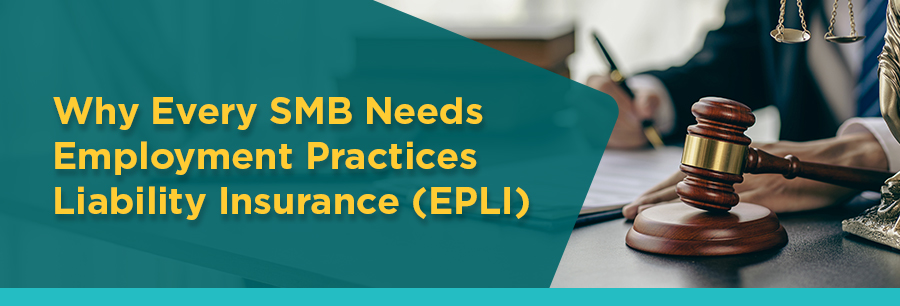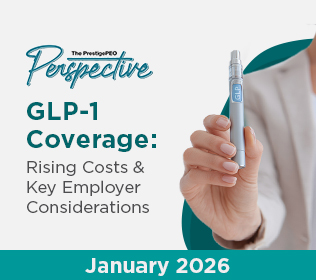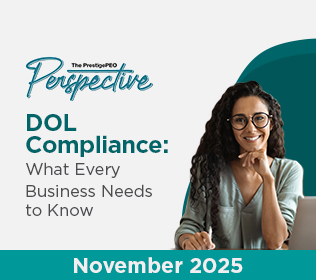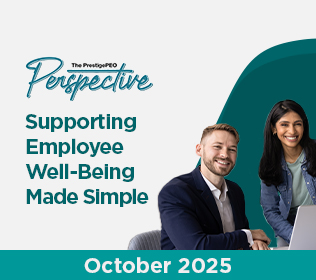

How PrestigePEO Can Help You Secure 401(k) Tax Credits Through the SECURE 2.0 Act
Are you making the most of the tax credits available to your business?
The SECURE 2.0 Act was created to help small and mid-sized businesses like yours expand access to retirement plans while providing valuable tax incentives that make starting up more affordable than ever.
If your business has fewer than 100 employees, you may qualify for:
- Up to $5,000/year for three years to offset startup and administrative fees
- $1,000 per eligible employee in credits for employer contributions
- $500/year in additional credits for offering automatic enrollment
Partnering with PrestigePEO gives your business access to our Multiple Employer Plan (MEP), a turnkey 401(k) solution that minimizes risk, simplifies compliance and eliminates administrative burden. We act as your plan sponsor, administrator, and trustee so you can focus on running your business.
Contact us to learn how we can help you support your employees’ financial futures and maximize tax benefits in 2025.

New York Jury Duty Pay Requirements Just Increased
NY Jury Duty Compensation Rose to $72 per Day as of June 9
As of June 9, 2025, a new law in New York State increases daily jury duty compensation from $40 to $72. This change impacts employer pay obligations, particularly for businesses with more than 10 employees, who must now pay up to $72 per day for the first three days of service.
If you’re a small or mid-sized business owner, staying compliant with evolving laws like this is critical, but it doesn’t have to be complicated.
Partnering with PrestigePEO means you’ll always be informed and prepared for important payroll and compliance updates that impact your business. Our team helps ensure your policies align with the latest requirements so you can focus on growth, not red tape.
Let’s connect and discuss how PrestigePEO can help simplify payroll compliance for your business.

Technology That Works as Hard as Your Business Does
Why SMBs Need Smarter HCM Solutions
Managing payroll, benefits, compliance, and HR tasks across multiple platforms can be overwhelming and cost your business time and money.
Modern SMBs are turning to advanced Human Capital Management (HCM) technology to streamline operations and elevate the employee experience.
Discover how PrestigePEO delivers integrated, easy-to-use technology tailored specifically for small and mid-sized businesses in our latest blog. From payroll automation to real-time data and compliance support, we simplify HR so you can focus on growing your business.

Shield Your Business from Employment-Related Claims
Why Every SMB Needs Employment Practices Liability Insurance (EPLI)
With nearly 40% of SMBs facing employee-related lawsuits and more than half fearing costly claims, EPLI coverage is no longer optional, it’s essential.
In our latest blog, learn how Employment Practices Liability Insurance through PrestigePEO provides financial protection and proactive HR risk management, helping you prevent disputes before they escalate.

Federal Ruling Updates Accommodation Rights under the Pregnant Workers Fairness Act - For Now
In Louisiana v. EEOC, the states of Louisiana, Mississippi, and other plaintiffs challenged EEOC guidance for abortion accommodations under the Pregnant Workers Fairness Act (PWFA). The EEOC’s guidance specifically considered an elective abortion to be a “related medical condition” to pregnancy and childbirth. It required employers to provide accommodations to employees seeking these elective abortions.
The court ruled that abortion is not considered a pregnancy-related condition requiring accommodation under this the PWFA. This ruling currently applies nationwide. However, other related cases are still pending in other federal courts which could change this outcome long-term.
As a reminder, the PWFA went into effect in 2023 and requires employers to provide pregnant workers with accommodations related to pregnancy and childbirth as long as they do not cause undo hardship. Employers should keep in mind that a variety of laws protect pregnant employees. Employers should be careful about denying pregnancy-related accommodation requests.
At PrestigePEO, we understand how quickly the compliance landscape can shift. As new rulings like this emerge, it is critical to stay proactive and protect your business from unnecessary risk.
Partnering with PrestigePEO means you’ll always have expert guidance and real-time support to help interpret new regulations, update policies, and ensure compliance with evolving federal and state laws.
Ready to take the guesswork out of compliance? Let’s talk about how PrestigePEO can support your business.

DOJ Expands Focus on Immigration Law Violations
The U.S. Department of Justice (DOJ) has expanded its corporate enforcement efforts to include violations of federal immigration law—particularly misuse of work visa programs like the H-1B. This change, announced in a new policy memo titled “Focus, Fairness, and Efficiency in the Fight Against White-Collar Crime,” means employers could face more investigations and whistleblower complaints related to immigration practices.
What’s new?
The DOJ’s Corporate Whistleblower Program now includes immigration-related violations. This gives whistleblowers a new way to report suspected visa fraud or misuse of employment-based immigration programs, such as underpaying workers or filing false visa petitions. The DOJ is also working closely with the FBI, which is prioritizing immigration enforcement over other white-collar crimes.
Why this matters to employers:
Although past whistleblower lawsuits under the False Claims Act (FCA) often failed in immigration-related cases, the new DOJ program may be more effective. It allows whistleblowers to report companies for immigration violations even when those claims don’t involve direct government payments.
In addition, federal criminal laws—like making false statements or committing fraud—can apply to visa filings. These charges are harder to defend and carry more serious consequences.
What employers should do now:
- Include immigration compliance in your company’s internal audits and investigations.
- Make sure your visa filings are accurate and truthful.
- Create secure channels for employees to report concerns without fear of retaliation.
- Train HR, legal, and hiring teams on visa rules and immigration compliance.
- Take all whistleblower reports seriously and respond promptly.
Bottom line: Immigration compliance is now a key area of corporate risk. With greater enforcement and more ways for whistleblowers to report, employers must act now to ensure their practices are fully compliant.
As immigration law enforcement becomes a growing area of corporate risk, now is the time to strengthen your internal policies, training, and reporting procedures.
Partnering with PrestigePEO means you gain access to expert HR and compliance guidance, which includes proactive risk management and support tailored to small and mid-sized businesses. We help you navigate complex employment laws so you can focus on confidently growing your business.
Connect with PrestigePEO to learn how we can help protect your organization from compliance missteps.

“One Big Beautiful Bill Act” is Still Evolving: What This Could Mean for No-Tax Tips & Overtime
The “One Big Beautiful Bill Act” passed the House on May 22, 2025, but is not yet law. If enacted, two key provisions would let employees exclude certain tip income and overtime pay from their federal taxable income for 2025–2028. While this lightens the tax burden on tipped and hourly-plus-overtime workers, employers’ core payroll duties remain largely the same.
If the “One Big Beautiful Bill Act” becomes law, employers will see the following changes:
“No Tax on Tips” – What changes:
- Employees may deduct all “qualified tip income” on their federal returns.
- Gross tip earnings drop out of taxable income at filing.
What stays the same:
- Employers must continue withholding federal income tax, Social Security, and Medicare on every dollar of tip income.
- State and local tax withholding rules remain in force.
- Payroll systems must be updated to capture tips separately for a new W-2 box labeled “Total Qualified Tips.”
“No Tax on Overtime” – What changes:
- Non-highly compensated employees can deduct “FLSA-eligible overtime pay” on their 2025–2028 federal returns.
- Overtime earnings no longer count toward federal taxable income at filing.
What stays the same:
- Employers must continue withholding federal income tax and FICA on all overtime wages.
- State and local withholding rules remain unchanged.
- Payroll platforms need configuration to tag FLSA-eligible overtime and populate a new W-2 box labeled “Total FLSA-Eligible Overtime Wages.”
Preparing for Compliance
Because the Act is not yet final, employers should begin reviewing payroll practices now. Key steps include auditing software configurations, validating year-end reporting, and training HR and payroll teams on the definitions of “qualified tips” and “qualified overtime.” Clear employee communications will also be essential: staff should understand that their take-home pay remains the same until tax filing, when they can claim the new deductions.
While this bill is still in flux, it has profound implications for payroll reporting and year-end tax compliance. Employers must be ready to adjust systems, train staff, and communicate changes to employees.
By partnering with PrestigePEO, you gain a trusted compliance ally who monitors legislative changes, updates payroll configurations, and ensures your HR team is always informed and prepared.
Want to eliminate the guesswork? Connect with PrestigePEO to see how we can help your business stay ahead of the curve.

Federal Update: DOL Pauses Enforcement of 2024 Independent Contractor Rule
The U.S. Department of Labor (DOL) announced in May 2025 that it will not enforce the 2024 independent contractor rule in agency investigations for the time being. Instead, the DOL has directed investigators to revert to prior guidance, including a 2008 fact sheet and a 2019 opinion letter, while it evaluates the potential rescission of the 2024 rule altogether.
This change does not indicate that the 2024 rule has been withdrawn. It still applies in private litigation, and businesses must continue to comply with it when assessing worker classification under the Fair Labor Standards Act (FLSA). However, the DOL’s enforcement stance has shifted to rely on the pre-2024 guidance, which many employers and courts find to be more objective and predictable.
The 2024 rule expanded the criteria for employee status by requiring a totality-of-the-circumstances analysis of six economic reality factors, without prioritizing any single factor. By returning to previous guidance, the DOL signals a more cautious approach to enforcement.
Businesses should note that several states maintain stricter standards than the federal test, including California, New Jersey, Massachusetts, and Illinois, which utilize variations of the ABC test. Additionally, other states, such as New York, Oregon, and Colorado, implement their multifactor frameworks, which diverge from federal law and can be more restrictive in practice.
Employers who engage independent contractors should regularly review their classifications to ensure compliance with both federal and state laws, especially when state standards impose stricter tests.
Although the DOL’s enforcement has paused, the 2024 rule still holds weight, particularly in private litigation. Combine that with stricter state-level standards, and employers’ risks around worker classification remain high.
PrestigePEO gives you a compliance ally who understands the nuances of federal and state labor laws. We’ll help you assess your workforce, stay ahead of regulatory shifts, and avoid penalties tied to misclassification.




